
Erica Korb, Ph.D.
Principal Investigator
Erica Korb runs a lab in the Department of Genetics and is a member of the Penn Epigenetics Institute. Erica received her B.S. from Yale University in Molecular Biology and worked as a research assistant at both Yale and the NIH. She received her PhD from the University of California, San Francisco in neuroscience where she worked with Dr. Steve Finkbeiner. She then went on to the Rockefeller University for her postdoctoral training under Dr. C. David Allis. She has won several awards for her work over the years including the Alfred P. Sloan fellowship, the Klingenstein-Simons young investigator award, the NARSAD young investigator award, the NIH Pathway to Independence Award, and the F32 and F31 Fellowship Awards. Outside of the lab, Erica enjoys playing an eclectic mix of sports including cycling, ultimate Frisbee, and fencing.
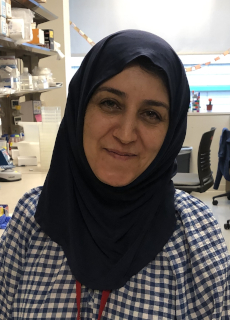
Rili Ahmad, B.S.
Research Specialist
Rili Ahmad received her B.S. in Biology and B.A. in Psychology from George Washington University, and worked with Dr. Hu on molecular mechanism of Atherosclerosis. She then worked in the Laboratory of Neurogenetics at NIA/NIH to study the effects of mutations associated with Parkinson’s disease on protein function. From there she went on to the University of Miami where she studied snRNA biomarkers for early detection of Parkinson’s disease. In the Korb lab she serves as lab manager and does research on chromatin mutations that affect autism. On her free time, Rili has a passion for community service and is an active member of the UPENN community outreach program PENN CARES. She loves to read, hike and has a general love for the outdoors.
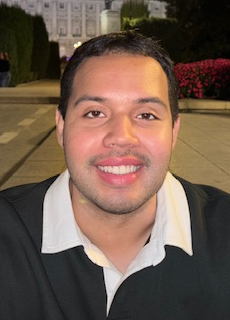
Diego Carias, B.A.
Research Assistant
Diego Carias received his B.A. in Biology from Amherst College in 2023. There, he was involved in undergraduate research in the laboratory of Josef Trapani studying the startle response behavior in larval zebrafish. After graduating, he joined the Scammell Laboratory at Beth Israel Deaconess Medical Center as a Research Assistant. There, he helped manage the laboratory while studying narcolepsy in mice and participated in related projects involving fiber photometry, sleep recordings, and pharmacology. Diego is interested in learning more about how epigenetics influence neurodevelopmental disorders and brain development. Outside of the lab, he enjoys watching soccer, reading, and going to museums.
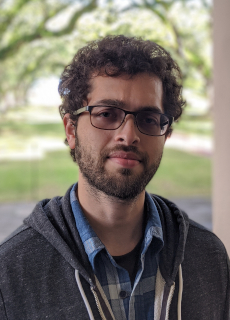
Alekh Paranjapye, Ph.D.
Postdoc
Alekh Paranjapye received his B.S. in microbiology with a minor in philosophy from the University of Washington. He then worked at the Institute for Systems Biology in Seattle as a research assistant before going on to receive his Ph.D. in Genetics and Genome Sciences from Case Western Reserve University under the mentorship of Dr. Ann Harris. There, he applied both bench and computational techniques to study chromatin dynamics and gene regulation in human lung epithelial cells, with additional focus placed on the epigenetics of cystic fibrosis.
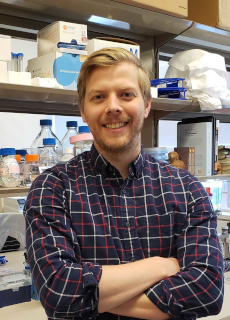
Brad Lukasak, Ph.D.
Postdoc
Brad received his B.S. in chemistry in 2016 from the University of Pittsburgh. While there, he worked in the lab of Alex Deiters where he studied conditional activation of small molecules. He was named a Beckman Scholar for this work. He obtained his PhD from Princeton University in the lab of Tom Muir. Over his six years in Princeton, he studied histone serotonylation, characterizing the enzymatic activity of TGM2 using a suite of biochemical methods. In the Korb lab, Brad’s interest in epigenetics continues, shifting his focus to the field of neuroepigenetics. He is particularly interested in using these technologies to understand the molecular basis of behavior and memory. Outside of the lab, Brad’s interest includes watching sports, playing videogames, running, grilling, and spending time with his nieces/nephews.
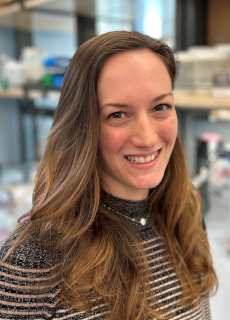
Jenna Petronglo, Ph.D.
Postdoc
Jenna Petronglo received her B.S. in Biological Sciences from Fordham University in 2014. After graduating, she worked as a research assistant at the Albert Einstein College of Medicine where she gained experience in neuroscience research. She joined the Interdisciplinary Graduate Program at Vanderbilt University in 2017 and completed her Ph.D. under the mentorship of Dr. Jim Cassat in 2023. Her dissertation interrogated how inflammation from the host response to Staphylococcus aureus osteomyelitis (bone infection) influences the bone-resorbing osteoclast to promote bone loss and damage. As a postdoc in the Korb lab, Jenna is excited to apply her immunology background toward studying how epigenetic regulators drive neurological disease. Outside of the lab, she enjoys live music, playing the piano, and getting lost in a great book.
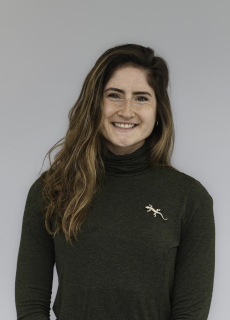
Audrey Goldfarb, Ph.D.
Postdoc
Audrey received her B.A. in Biology from the University of Rochester in 2019, where she studied cancer avoidance mechanisms of long-lived rodents in the labs of Vera Gorbunova and Sina Ghaemmaghami. She completed her Ph.D. in the de Lange lab at Rockefeller University in 2025, where she studied mechanisms of telomere protection by the shelterin complex. In the Korb lab, Audrey is primarily interested in the epigenetic mechanisms underlying neurodevelopmental disorders. Outside of the lab, Audrey enjoys science communication, fiction writing, cycling, yoga, and being in nature.
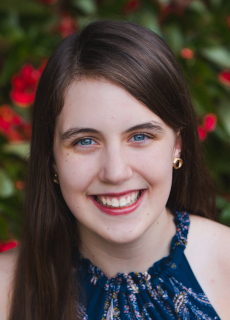
Anna Voss, B.S.
Graduate Student
Anna is a PhD student in the Neuroscience Graduate Group. She graduated from Emory University in 2022 with a B.S. in Neuroscience and Behavioral Biology and a minor in statistics. While at Emory, Anna worked in the lab of Dr. Steven Sloan where she studied neuronally secreted ligands that influence astrocyte development. In the Korb Lab, Anna is interested in studying the influence of histone variants and epigenetic modifications on glial cells and how these factors can impact neuropsychiatric disorders. Outside of lab, Anna loves to row on the Schuylkill River, go record shopping, and watch stand-up comedy.

Annastelle Cohen, M.S.
Graduate Student
Annastelle is a PhD student in the CAMB Genetics and Epigenetics program and a T32 trainee. She received her B.S. in Biology and M.S. in Cell and Molecular Biology from American University, where she was also a NASA DCSGC summer research fellow. In the Korb lab, Annastelle hopes to contribute to the understanding of basic mechanisms underlying neuronal chromatin regulation and their implications in emerging neurodevelopmental disorders. When not at the bench, she enjoys doing the daily “-dle” games (Wordle, Worldle, Tradle, Nerdle), listening to music, playing pool and board games with friends, and eating Spread bagels by the Schuylkill.
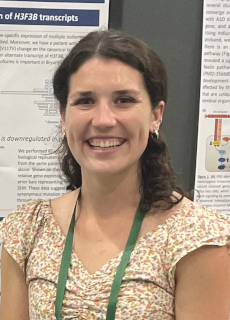
Annabel Sangree, B.S.
Graduate Student
Annabel obtained her BA in Biology from Hamilton College in 2018. After graduating, she worked as a research associate at the Broad Institute in the Genetic Perturbation Platform where she optimized CRISPR tools for large scale screens. Annabel became interested in neuroepigenetics through her work studying how mutations in histone H3.3 perturb neurodevelopment. In the Korb lab, she is interested in studying the dynamics of histone variants in the brain. Outside of lab you can find her running, hiking with her dog Cooper, and tending to her sourdough starter.
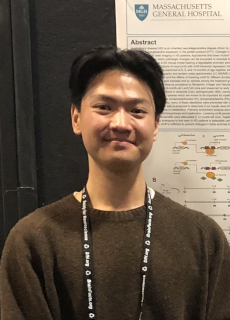
Kai Shing, B.S.
Graduate Student
Kai received his B.S. in Psychological Sciences from the University of Vermont in 2020. Following graduation, he worked as a research technician at Harvard Medical School and Massachusetts General Hospital, where he studied Huntington’s disease in the laboratories of Dr. Marian DiFiglia and Dr. Kimberly Kegel-Gleason. He is currently a PhD student in the Neuroscience Graduate Group. In the Korb Lab, his research focuses on understanding how histone variants and epigenetic modifications influence cellular function in the brain, with a particular interest in glial cells. Outside of the lab, Kai enjoys cooking, watching sports, cycling, exploring new restaurants, and attending live music and stand-up comedy with friends.

Ishani Modi
Undergraduate
Ishani Modi is an undergraduate student at the University of Pennsylvania studying biochemistry on the pre-medical track. She is interested in the intersection of genetics and neurological disorders. Ishani is helping the lab study the influence of histone variants and epigenetic modifications in neurons. In her free time, she enjoys exploring Philadelphia and spending time with friends.
Alumni
| Name | Role | Departed | Post Korb Lab |
|---|---|---|---|
| Marissa Maroni | Graduate Student | 2025 | Postdoc, Brown University |
| Sean Louzon | Graduate Student | 2025 | Postdoc, CHOP |
| Camille Quaye | Undergraduate | 2025 | Gap year |
| Emily Feierman | Graduate Student | 2024 | Postdoc, CHOP/University of Pennsylvania |
| Katherine Lynch | Undergraduate | 2024 | Med school, University of Pennsylvania |
| Shreya Mehtra | Undergraduate | 2024 | Med school, University of Pennsylvania |
| Roxanne Perez Tremble | Postbac | 2024 | Grad school, University of Pennsylvania |
| Éloïse L'Her | Research Assistant | 2023 | Med school |
| Sam Thudium | Research Assistant | 2022 | Grad school, Data Science, University of Pennsylvania |
| John Kee | Research Assistant | 2022 | Med school, Jefferson University |
| Kate Palozola | Postdoc | 2022 | Senior Investigator, Aro Biotherapeutics |
| Melissa Barton | Masters Student | 2022 | Research Associate, Spark Therapeutics |
| Kiara Rodriguez | Undergraduate | 2022 | Grad school, Genetics and Epigenetics, University of Pennsylvania |